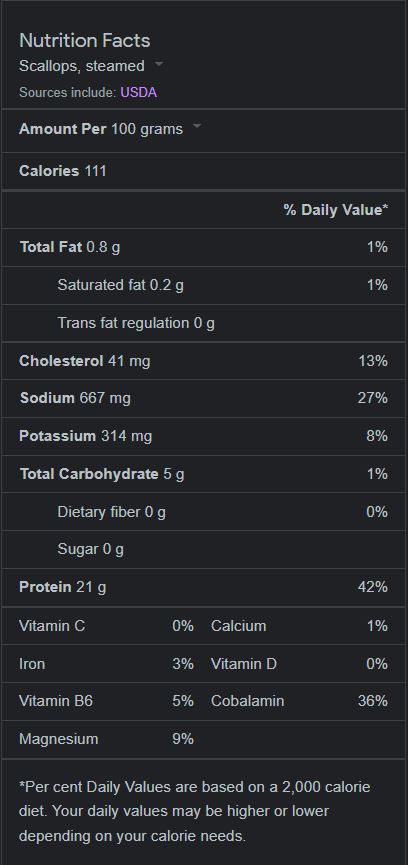
Cholesterol Question: Do Scallops Have Cholesterol? - Scallop Nutrition Facts and Health Benefits
Cholesterol is a key nutrient for your health and well-being. But what about scallops? Do they have cholesterol? According to some, yes, scallops do have cholesterol. But according to others, no, scallops do not have cholesterol. So which is true? Is scallop cholesterol-free? Let's take a closer look.
What is Cholesterol?
Cholesterol is a substance found in the body that helps to carry oxygen and nutrients around. It also helps to create blood cells and help them function properly. According to Medical News Today, a healthy adult should keep their total cholesterol levels under 200 mg/dl. Readings of 200–239 mg/dl is borderline high, and readings of at least 240 mg/dl is a high level..
There are two types of cholesterol: LDL and HDL. HDL helps rid your body of excess cholesterol so it's less likely to end up in your arteries. LDL ("bad cholesterol") takes cholesterol to your arteries, where it can collect in your artery walls. Too much LDL leads up to an increase chances of blood clots in your arteries (source: Healthline).
Therefore, when it comes to enjoying your scallops, enjoying in a moderate consumption.
Top 8 Health Benefits Of Scallop And Its Nutrition Facts
Scallops have several health benefits. Overall, the health benefits of scallop include:
- Contribution to weight loss
- Reduce your risk of stroke
- Inhibit the growth of cancerous cells
- Improve your cognitive function
- High in anti-oxidants
- Contains nutrients for immune support and growth
- Supports heart function and reduce heart disease.
Read further for exact nutritional value contents.
Scallop Nutrition Facts - Vitamins and Minerals
They are a good source of protein, B vitamins, zinc, and selenium. They are low in calories, making them a healthy choice for people who are trying to lose weight. Other benefits include:
- Adequate selenium sustains a healthy immune system and thyroid function
- Zinc benefits brain function and healthy growth
- Magnesium and potassium both keep your heart healthy
- Contains anti-inflammatory Omega-3 fatty acids.
- Omega-3 itself can also promote a healthy brain, hair growth, and immune system.
Below is a nutrition table for 100 grams of Steamed Cooked scallop for reference (source: USDA)

Scallops can be cooked in many different ways, including steaming, baking, frying, or microwaving. This is a safe way to eat them, however, they can also be eaten raw as sushi. Remember to find a reputable sushi restaurant.
What Are the Health Risks of Eating Scallops with Cholesterol?
There are a few potential health risks associated with eating scallops with cholesterol, including:
- Some people may experience problems with their liver, including hepatitis and cirrhosis
- High Cholesterol can also be a risk for developing early-onset pancreatitis
- If you have a genetic condition that increases your risk for heart disease, eating scallops with cholesterol may increase your risk
- Eating scallops with cholesterol may also increase your risk of developing other types of cancer
- Some people may have an allergy to shellfish and crustaceans, so consumption may not be safe.
Unless you have an allergy to this mollusk, a moderate serving of well-prepared scallops on occasion is safe.
Scallop Nutrition Information: Is this seafood safe to eat Scallops? Is it Nutritious?
In summary, Scallops do contain cholesterol. Moderate consumption is always advised when it comes to eating any foods. Scallops are the same. Scallops do contain many health benefits, including vitamins, minerals, and lower calories. Thus, they are beneficial for most diets.
Conclusion
Cholesterol is a necessary part of the food we eat, and the health benefits of eating scallops with cholesterol are vast. However, it's important to be aware of the health risks associated with reducing cholesterol levels. By avoiding reducing cholesterol in your diet, you can enjoy all the health benefits of scallops without any negative consequences. Additionally, by enjoying Cholesterol-rich skins whenever you eat scallops, you can get all the healthy nutrients that are found in these dishes without sacrificing their taste or texture.
Work in Progress.
Disclaimer
Information on this site is in no way meant to replace the advice of a professional. Please ensure to fact check and acquire professional help regarding all information on this site.




